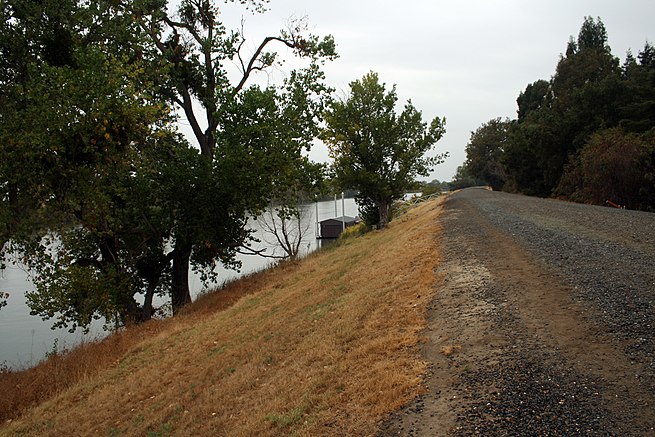
-
Levee
A levee (), dike, dyke, embankment, floodbank or stopbank is an elongated naturally occurring ridge or artificially constructed fill or wall, which regulates water levels. It is usually earthen and often parallel to the course of a river in its floodplain or along low-lying coastlines.
-
Levee (noun)
An embankment to prevent inundation; as, the levees along the Mississippi.
-
Levee (noun)
The steep bank of a river.
-
Levee (noun)
The border of an irrigated field.
-
Levee (noun)
A pier or other landing place on a river.
-
Levee (noun)
The act of rising; getting up, especially in the morning after rest.
-
Levee (noun)
A reception of visitors held after getting up.
-
Levee (noun)
A formal reception, especially one given by royalty or other leaders.
-
Levee (verb)
To keep within a channel by means of levees.
“to levee a river”
-
Levee (verb)
To attend the levee or levees of.
-
Levy (verb)
To impose (a tax or fine) to collect monies due, or to confiscate property.
“to levy a tax”
-
Levy (verb)
To raise or collect by assessment; to exact by authority.
-
Levy (verb)
To draft someone into military service.
-
Levy (verb)
To raise; to collect; said of troops, to form into an army by enrollment, conscription. etc.
-
Levy (verb)
To wage war.
-
Levy (verb)
To raise, as a siege.
-
Levy (verb)
To erect, build, or set up; to make or construct; to raise or cast up.
“to levy a mill, dike, ditch, a nuisance, etc.”
-
Levy (noun)
The act of levying.
-
Levy (noun)
The tax, property or people so levied.
-
Levy (noun)
The Spanish real of one eighth of a dollar, valued at elevenpence when the dollar was rated at seven shillings and sixpence.
-
Levee (noun)
an embankment built to prevent the overflow of a river.
-
Levee (noun)
a ridge of sediment deposited naturally alongside a river by overflowing water.
-
Levee (noun)
a landing place; a quay.
-
Levee (noun)
a formal reception of visitors or guests
“the great stop on the Washington social circuit was the diplomat’s levee”
-
Levee (noun)
an afternoon assembly for men held by the British monarch or their representative
“he was presented at one of Prince Albert’s levees in 1850”
-
Levee (noun)
a reception of visitors just after rising from bed.
-
Levy (verb)
impose (a tax, fee, or fine)
“a tax of two per cent was levied on all cargoes”
-
Levy (verb)
impose a tax, fee, or fine on
“there will be powers to levy the owner”
-
Levy (verb)
seize (property) to satisfy a legal judgement
“there were no goods to levy upon”
-
Levy (verb)
enlist (someone) for military service
“he sought to levy one man from each vill for service”
-
Levy (verb)
begin to wage (war)
“they then proceeded without further ceremony to levy war upon the king”
-
Levy (noun)
an act of levying a tax, fee, or fine
“police forces receive 49 per cent of their funding via a levy on the rates”
-
Levy (noun)
a tax raised by levying
“we all pay a fossil fuel levy in our electricity bills”
-
Levy (noun)
a sum collected as a supplement to an existing subscription
“the trade-union political levy”
-
Levy (noun)
an item or items of property seized to satisfy a legal judgement.
-
Levy (noun)
an act of enlisting troops
“Edward I and Edward II had made substantial use of the feudal levy for raising an army”
-
Levy (noun)
a body of troops that have been enlisted
“lightly armed local levies”
